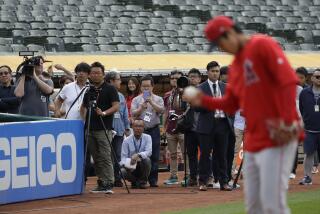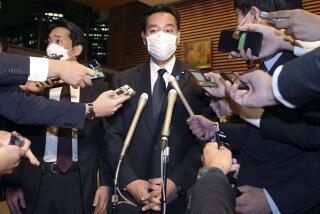Japanese Police Arrest Supreme Truth Cult’s Attorney : Investigation: Lawyer accused of defamation for saying that factory spread sarin near sect compound.
- Share via
TOKYO — Yoshinobu Aoyama, the suave lawyer for the doomsday Aum Supreme Truth sect, whose frequent television appearances made his name a household word in Japan, was arrested Wednesday.
Although the sect is suspected of releasing sarin nerve gas in Tokyo subways on March 20, Aoyama’s detainment--like the arrests of more than 150 other members of the cult--was carried out on other charges. The lawyer was accused of defamation in statements he made at a Jan. 4 news conference.
Police took Aoyama, 35, into custody at the Arakawa Police Station in Tokyo after he had conferred with an arrested Supreme Truth member who was being detained there.
Aoyama was accused of falsely charging that a fertilizer factory in Kamikuishiki near Mt. Fuji spread sarin around a sect complex there.
Police explained that they arrested Aoyama after determining that the fertilizer company, which filed a defamation lawsuit, could not have produced the sarin that Aoyama accused it of spreading.
NHK, the semi-governmental radio and TV network, reported that police wanted to question Aoyama about reports that he had ordered Supreme Truth leaders to conceal documents about the cult’s activities. Aoyama, as one of the group’s top officials and an aide of Shoko Asahara, the cult’s leader, is believed to know about all of Supreme Truth’s activities.
Police also wanted to end Aoyama’s meetings with arrested sect leaders, the network reported. Aoyama, who has been representing the cult and its arrested members, was effective in persuading sect leaders to remain silent during questioning, NHK reported.
Under Japanese law, suspects may be held for questioning for up to 21 days before they must be indicted or released.
At an evening news conference, Fumihiro Joyu, the sect’s principal spokesman, called Aoyama’s arrest “unfair.” He said the lawyer’s incarceration will harm the group’s ability to deal with mounting arrests of its members. “There are only a very small number of lawyers who are willing to cooperate with us,” Joyu said.
He again refused to reveal the whereabouts of Asahara, who disappeared from public view after the sarin attack.
Aoyama staged televised news conferences and appeared on TV talk shows almost daily since police raided sect facilities March 22, two days after the poison gas was released in Tokyo’s subways, killing 12 and afflicting more than 5,500.
Although unsmiling Aoyama did little more than deny charges against the cult, audiences were fascinated with his good looks, cool demeanor and his elite Kyoto University background. His name became so infamous that a men’s clothing firm also named Aoyama found customers boycotting its chain of stores in the mistaken belief that the shops are owned by the sect.
More to Read
Sign up for Essential California
The most important California stories and recommendations in your inbox every morning.
You may occasionally receive promotional content from the Los Angeles Times.













